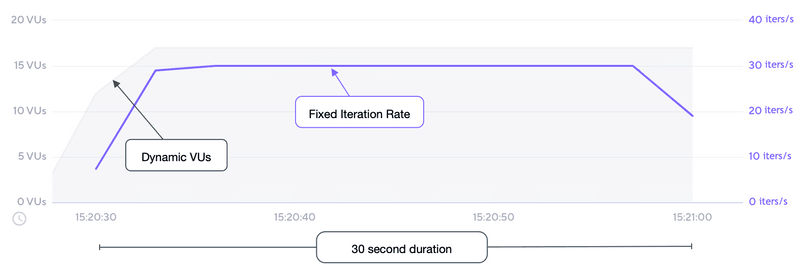With the constant-arrival-rate executor, k6 starts a fixed number of iterations over a specified period of time. It is an open-model executor, meaning iterations start independently of system response (for details, read Open and Closed models).
This executor continues to start iterations at the given rate as long as VUs are available. The time to execute an iteration can vary with test logic or the system-under-test response time. To compensate for this, the executor starts a varied number of VUs to meet the configured iteration rate. For explanations of how allocation works, read Arrival-rate VU allocation.
noteIteration starts are spaced fractionally.
Iterations do not start at exactly the same time. At a rate of 10 with a timeUnit of 1s, each iteration starts about every tenth of a second (that is, each 100ms).
Options
Besides the common configuration options, this executor has the following options:
| Option | Type | Description | Default |
|---|---|---|---|
| duration(required) | string | Total scenario duration (excluding gracefulStop). | - |
| rate(required) | integer | Number of iterations to start during each timeUnit period. | - |
| preAllocatedVUs(required) | integer | Number of VUs to pre-allocate before test start to preserve runtime resources. | - |
| timeUnit | string | Period of time to apply the rate value. | "1s" |
| maxVUs | integer | Maximum number of VUs to allow during the test run. | If unset, same as preAllocatedVUs |
When to use
When you want iterations to remain constant, independent of the performance of the system under test. This approach is useful for a more accurate representation of RPS, for example.
noteDon't put sleep at the end of an iteration.
The arrival-rate executors already pace the iteration rate through the rate and timeUnit properties. So it's unnecessary to use a sleep() function at the end of the VU code.
Example
This example schedules a constant rate of 30 iterations per second for 30 seconds. It allocates 50 VUs for k6 to dynamically use as needed.
Observations
The following graph depicts the performance of the example script:
Based upon our test scenario inputs and results:
- The desired rate of 30 iterations started every 1 second is achieved and maintained for the majority of the test.
- The test scenario runs for the specified 30 second duration.
- Having started with 2 VUs (as specified by the preAllocatedVUs option), k6 automatically adjusts the number of VUs to achieve the desired rate, up to the allocated number. For this test, this ended up as 17 VUs.
- Exactly 900 iterations are started in total, 30s * 30 iters/s.
Using too low of a preAllocatedVUs setting will reduce the test duration at the desired rate, as resources need to continually be allocated to achieve the rate.
